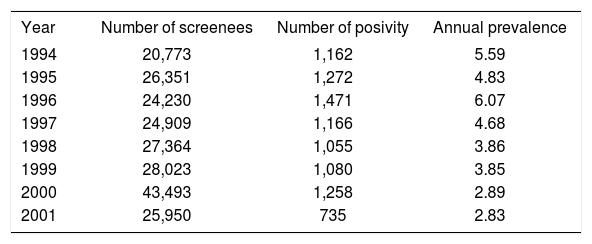Editor, hepatitis B virus (HBV) infection is an important viral infection. Chronic HBV infection can result in a very serious complication, hepatoma. HBV serology is a basic screening test in laboratory medicine at present.1 Of several serological parameters, HBs Ag is the suggested parameter for HBV screening. Since this test is easily available, therefore, this serological test is accepted as standard for HBV detection at present.2,3 HBsAg is still widely used tool for screening for HBV in Thailand. The standard main recommendations for screening are antenatal test and blood banking test. However, there are also other recommendations including screening for the workers who want to go abroad. In this work, the authors summarize the authors studied of HBs Ag seropositivity in Thai workers going aboard from a tertiary hospital in Thailand. The data on the screening HBV serology in Thai workers going aboard who visited the laboratory of Rajvithi Hospital Bangkok during 1994-2001 was reviewed (More recent data is not available therefore not reviewed). The screening method in this study is standard HBsAg blood test. The annual and overall prevalence were calculated.
According to this work, there are overall 221,093 workers participating in the HBV serology screening program. There is no modification in the age of included subjects along the time. The HBsAg + ve can be seen in 9,199 cases giving overall prevalence equal to 4.16 %. Considering the annual prevalence, the details are shown in Table I. In this work, the author tried to study the results of screening HBV serology in Thai workers going aboard. Since these workers have healthy external appearance, the result might also reflect the situation in healthy general population. Of interest, there is a clear reduction in the annual prevalence rates since 1994 until 2001. It might reflect the effect of universal vaccination at birth which is firstly implemented in Thailand in 1980's. According to this work, there are a considerable number of HBs Ag positive cases (4.16%) implying that HBV infection is still the main infectious disease in Thailand. The high rate of disclosed HBV infection also implies the possible high rate of future hepatoma cases. Of interest, the screening program is voluntary not compulsory for everybody who wants to emigrate. It is suggested that affected HBV cases can have relapse during hard work aboard, therefore, affected cases are suggested for no migration. In addition, the results may not directly reflect the actual situation on the Thai population, as many subjects aware of their HbsAg positive results may prefer to evitate this screening as they know that they will be counseled not to emigrate.
Annual prevalence of HBsAg + ve among workers who received screening HBV serology.
| Year | Number of screenees | Number of posivity | Annual prevalence |
|---|---|---|---|
| 1994 | 20,773 | 1,162 | 5.59 |
| 1995 | 26,351 | 1,272 | 4.83 |
| 1996 | 24,230 | 1,471 | 6.07 |
| 1997 | 24,909 | 1,166 | 4.68 |
| 1998 | 27,364 | 1,055 | 3.86 |
| 1999 | 28,023 | 1,080 | 3.85 |
| 2000 | 43,493 | 1,258 | 2.89 |
| 2001 | 25,950 | 735 | 2.83 |
The authors hereby would like to thank Ms. Sunee Singhanati, B.Sc. who give the data on the screening result for this work.










